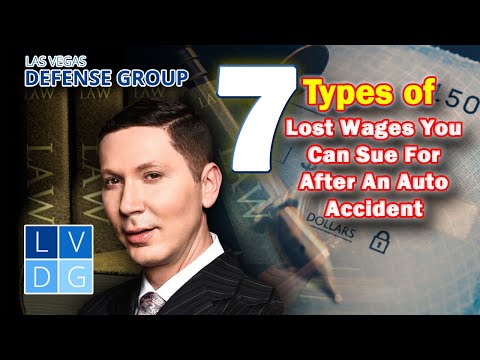
Accident victims in Nevada can often get compensation for lost income and wages. To do so, you must be able to document and prove the lost wages, that the time off was medically necessary, and that the defendant is at fault for causing the injury.
Sources of lost wages in Nevada can include:
- Regular pay,
- Overtime pay,
- Commissions,
- Bonuses,
- Self-employment income,
- Vacation or sick days you had to use up, and
- Any other lost perks or benefits you lost for that period (such as a car allowance or free meals).
In essence, the total value of anything you definitely or likely missed out on due to your injury is added up to get your total “lost wages” in a Nevada personal injury suit.
In this article, our Nevada personal injury lawyers will answer the top 10 questions about lost wages in Nevada injury cases:
- 1. What is a “lost wages letter”
- 2. How do I prove lost self-employment income?
- 3. Can I recover lost wages if I used personal days, sick days or vacation time?
- 4. Can I claim lost overtime, commissions, bonuses or perks in a Nevada personal injury case?
- 5. How can I prove lost income from tips in Las Vegas?
- 6. Are “lost wages” taxable in Nevada?
- 7. Can I recover for lost unemployment insurance benefits?
- 8. How long do I have to file a claim for lost wages in Nevada?
- 9. What if I was injured on the job?
- 10. What is the difference between lost wages and lost earning capacity?
- Additional resources
1. What is a “lost wages letter”?
If you are an employee, your best proof of lost wages is a letter from your employer. This letter from your employer should state:
- Your job title,
- The date on which you were hired and confirmation that you are (or were) an employee as of the date of the injury or accident,
- The number of hours you normally work per week,
- Your regular rate and frequency of pay,
- Your overtime rate (if applicable) and the number of overtime hours you normally work per week,
- The number of days or hours of work you missed,
- Any amounts you could reasonably have expected to receive in overtime pay, commissions or bonuses during that period, and
- Any other perks to which you would have been entitled but didn’t receive.
If your employer is not willing to write a letter, you will have to establish your lost wages by other means, such as past pay stubs and income tax returns.

A detailed letter from your employer can serve as proof of your lost wages.
2. How do I prove lost self-employment income?
You will need documents that, taken as a whole, show what you would have billed or been paid for the period you missed.
Documents that can help establish your lost self-employment income include:
- Your tax return for the prior year,
- Billing statements for the months preceding the accident or injury (or, if your income is seasonal, for the same period during the preceding year),
- If your income is very complicated, testimony by a forensic accounting expert witness.
3. Can I recover lost wages if I used personal days, sick days or vacation time?
If you had to use paid sick days, personal days or vacation time due to an injury caused by someone else, you can claim reimbursement for those days.
You can also claim any lost sick, personal or vacation days you had to use so that you could go your doctor or physical therapist after you returned to work.1
4. Can I claim lost overtime, commissions, bonuses or perks in a Nevada personal injury case?
If you would normally have expected to receive overtime pay, commissions, bonuses or perks during your period of missed work you can claim them as lost wages in Nevada.
You will have to prove that but for your injury, you would have:
- Worked overtime house,
- Made money on commission,
- Earned a bonus, and/or
- Been entitled to a perk (such as a car allowance).2
Potential proof includes:
- If your overtime pay or commissions are regular, past pay stubs showing a pattern;
- If your overtime pay or commissions are seasonal, an explanation from your employer (plus pay stubs for the prior year, if available);
- If your overtime, commissions or a bonus was contingent on a special event, a letter from your employer detailing the event and specifying the amount you would have been expected to receive; and/or
- A letter from your employer specifying your lost bonus pay and the conditions for earning the bonus.
5. How can I prove lost income from tips in Las Vegas?
Your best bet for proving lost tips is usually with
- a letter from your employer or
- proof of a prior period’s income.
You can prove a prior period’s income by showing regular bank deposits on the same day of the week (for instance, the day after you get your regular paycheck) or with a copy of a prior tax return.
6. Are “lost wages” taxable in Nevada?
The IRS takes the position that damages intended to reimburse a plaintiff for lost wages are taxable. The argument is that the amount would have been taxed had it been paid as income.
In practice, however, settlements in personal injury cases are often for a lump sum which is not allocated between injuries and lost wages.3

A personal injury claim for lost wages can include a demand for lost tips.
7. Can I recover for lost unemployment insurance benefits?
You are not entitled to unemployment insurance benefits in Nevada unless:
- You are physically and mentally able to work, and
- You are available to look for and accept work in your usual occupation.
You will usually have to file for disability benefits rather than unemployment for any time you are injured and unable to work.
However, suppose you lose your job and fail to earn enough base earnings to qualify for Nevada unemployment insurance due to your injury. In that case, you may have a claim based on lost unemployment benefits.
8. How long do I have to file a claim for lost wages in Nevada?
The statute of limitations for a lost wages claim in Nevada is generally two years. However, certain Nevada injuries have statutes of limitations that are longer or shorter than two years.
The one to be most aware of is the statute of limitations for medical malpractice in Nevada, which can be as short as one year.4
9. What if I was injured on the job?
If you were on the job when you were injured in Las Vegas, you may be limited to recovery under Nevada workers compensation laws.
Our Las Vegas injury lawyers can help you determine whether a third party is responsible for your work-related injury in Nevada.
10. What is the difference between lost wages and lost earning capacity?
Lost wages refers to actual income from your employment that you would have made had you not been injured. It is a measure of past damages.
Lost earning capacity refers to income you will be unable to earn in the future due to a serious injury. It is a prediction of future damages.
Additional resources
For more in-depth information, refer to these scholarly articles:
- Measuring the Pecuniary Loss in Damages for Personal Injuries – The Modern Law Review.
- Accidents, Money, and the Law: A Study of the Economics of Personal Injury Litigation – Tort and Medical Yearbook.
- Estimating Economic Loss in Personal Injury Cases – The CPA Journal.
- Tort Damages for Loss of Future Earnings – American Journal of Comparative Law Supplement.
- Undocumented Immigrants and Their Personal Injury Actions: Keeping Immigration Policy Out of Lost Wage Awards and Enforcing the Compensatory and Deterrent Functions of Tort Law – Roger Williams University Law Review.
Legal References
- See, generally, Southern Pac. Transp. Co. v. Fitzgerald (Nev. 1978) 577 P.2d 1234.
- See, generally, City of Henderson v. Wolfgram (Nev. 2021) .
- 26 USC 104 (a)(2).
- NRS 11.190. NRS 41A.097.

